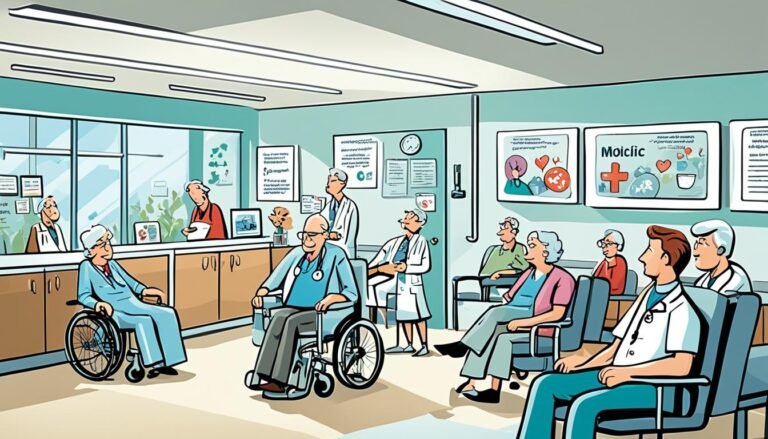Mental Health Services in Ireland: Current Trends and Future Directions
Did you know that during the COVID-19 pandemic, a staggering 70.6% of those getting mental health services in Ireland were women? This fact shows a big need for services that focus on women’s mental health. With 64.1% feeling really burned out, the need for good mental health care in Ireland is clear. Policies like “Sharing the Vision” and local efforts are making mental health support better and easier to get.
Key Takeaways
- 70.6% of mental health service participants during the pandemic in Ireland were female.
- 64.1% experienced moderate to high personal burnout.
- Government policies are focusing on comprehensive mental health support.
- Community-based mental health initiatives are increasing in prominence.
- Digital interventions are expanding to meet mental health needs.
Introduction to Mental Health Services in Ireland
Mental health services in Ireland have changed a lot over the years. They now focus more on what each person needs. A Vision for Change and Sharing the Vision have been key in making these changes.
The Evolution of Mental Health Policies
The mental health policies in Ireland have changed to improve care. The Vision for Change policy aimed to create teams that work together in communities. They focused on helping people recover and listened to what users needed.
Then, Sharing the Vision came along, building on what was already done. It aimed to make sure everyone in Ireland had access to mental health services. These changes mean better and more inclusive care, which is key for good health in Ireland.
Need for Comprehensive Services
It’s very important to have a wide range of mental health services. Ireland works to offer services that meet many different needs. With one in five people facing mental health issues, easy-to-get care is crucial. This care is made for each person’s unique situation.
Things like strong relationships, a good place to live, and steady money help with recovery. Community care and recovery colleges show how service users are involved in their healing. This is what person-centered care looks like in Ireland’s healthcare.
Current Trends in Mental Health Care
The mental health care scene in Ireland is changing fast. It’s all about early help and more online services. The government’s Sharing the Vision plan outlines big changes for mental health services from 2020 to 2030. It’s all about being proactive and trying new things.
Increased Focus on Early Intervention
Ireland is putting more effort into helping people early on. The Sharing the Vision plan has three-year plans for 100 policy changes from 2022 to 2024. It focuses on helping people before problems get worse.
It’s looking at helping new moms, young people, and those in urgent need. This shows how important it is to tackle issues early.
Expansion of Digital Mental Health Services
Online mental health services are changing how we get help, especially during the COVID-19 pandemic. More people are using online therapy and support groups. This move online is a big part of the Sharing the Vision plan.
It includes groups for women and young people facing special challenges. Adding more online services is part of making mental health care easier to reach for everyone.
Therapy Options Available in Ireland
Ireland has many therapy options for its people’s mental health. Community mental health teams (CMHTs) are key, offering care that includes psychiatric services, psychotherapy, and counseling. They help people find support and create plans for their care.
The Counselling in Primary Care (CIPC) service is a big part of Ireland’s therapy scene. Since starting in 2013, it has helped over 150,000 people. Studies show that 72% of clients got better or recovered with CIPC’s help, and many felt good even a year later.
CIPC aims to offer more support in primary care. It wants to help any adult with mild to moderate mental health issues. This could cut down on the use of certain medicines and improve life quality. It fits with the Sláintecare plan for quick, effective healthcare.
For specific issues like eating disorders, substance abuse, and intellectual disabilities, Ireland has special services. These services make sure people get the right care for their needs.
The HSE and primary care teams have played a big role in making these therapies work. They work together with GPs and counseling services to help people recover.
Overall, Ireland’s therapy options, like CIPC, show a wide approach to mental health care. This not only helps people now but also works towards long-term mental health.
Challenges in Treatment Accessibility
Getting mental health help in Ireland is hard because of many reasons. Places far from cities and money issues are big problems. These issues are even bigger in rural areas, where there are few services and getting around is hard.
Barriers Faced by Rural Populations
Rural areas have special challenges that cities don’t. There are not enough special mental health services in these places. People have to travel far for help, which is hard because there are few buses.
The economic problems have made things worse. Many people lost their jobs, especially long-term ones, making less money. This makes it hard for people in rural areas to pay for private mental health care. They often have to use public services that don’t have much.
Issues with Insurance and Funding
Insurance and funding issues also make it hard to get mental health care. The government spent less on health over the years. This meant less money for health care and higher costs for insurance.
These issues make services expensive and not everyone can afford them. Spending on medicines is a big part of health costs. This shows that costs are going up. We need big changes to make sure everyone can get mental health care, no matter their money situation.
Community-Based Initiatives for Mental Health Support
Ireland is using community resources to support mental health. These efforts focus on early help, making sure everyone feels included. They also work with local groups and health services to improve mental health care.
Early help is key in these community programs. They bring together doctors, social workers, and local groups. This creates strong community healthcare networks focused on mental health support.
A study by McGorry in 2007 talked about a youth mental health model. It showed the need to improve mental health care for young people. Ireland uses these models to help specific groups like youth with mental health issues.
The Australian Institute of Health and Welfare shares how similar models work well in Australia. A study in 2007 looked at how early help can prevent depression from coming back. Ireland’s approach is similar, aiming to keep mental health issues from happening again.
Studies show that community-based care works well. Research in 2007 looked at how young people seek help. Ireland’s networks aim to make sure everyone can get the support they need.
Working together on mental health issues helps reduce the load on hospitals. It also creates a supportive place for people to live well. With proof from around the world, Ireland’s efforts are making a big difference in mental health.
Role of Policy Reforms in Shaping Mental Health Services
Policy reforms have changed mental health services in Ireland a lot. They make sure mental health care is for everyone, focused on getting better, and meets the needs of those using the services.
Impact of Sharing the Vision Policy
The Sharing the Vision policy started in 2020. It built on the work of the A Vision for Change before it. This policy has brought big changes to mental health services.
It focuses on services that put the user first, aim for recovery, and work together as a team. It has given power to those getting services and made the services better across Ireland.
Recommendations from Vision for Change
The Vision for Change recommendations were made in 2006. They called for a new way to look at mental health services in Ireland. They stressed the need for a focus on recovery and always getting better.
By following these recommendations, Ireland has made big steps forward in mental health care. It’s now more about the unique needs of each person, giving them power, and building hope for a better future.
To sum up, policies like Sharing the Vision and Vision for Change keep making mental health services in Ireland better. They make sure the care is for everyone, works well, and meets the needs of those using it.
Mental Health Services in Ireland: Current Trends and Future Directions
Mental health services in Ireland are changing fast. They focus on a new mental health policy framework. This framework helps deliver services everywhere in the country. It puts a big focus on preventing problems and caring for communities.
Investing in new technologies and infrastructure is key for the mental health sector. The future looks bright with more focus on teletherapy and personalized care. This will improve mental health services for everyone.
Smoking is a big risk for mental health in Northern Ireland. Reports show a strong link between smoking and mental health issues. About one in three people in Northern Ireland face this problem, showing the need for action.
Groups like the Men’s Health Forum and the Irish College of Psychiatrists are helping a lot. They work with global groups like the World Health Organization. Events like the 9th European Conference on Tobacco or Health share important information. These efforts help shape the future of mental health services.
The Mental Health Act 2001 has given a clear way to deal with mental health issues. It has rules for ethical and practice codes. This makes mental health services more trustworthy.
Loneliness is a big problem, especially for older people in Ireland. It affects both their physical and mental health. Dealing with this issue needs work from many groups. It shows Ireland’s strong commitment to mental health policies.
Integration of Psychiatric and Counseling Services
Ireland aims to blend psychiatric and counseling services for a full treatment plan. This approach helps people get the care they need from a team of experts. It’s key for treating the whole person, not just one part of their health.
Psychiatric services work better when they’re together with counseling. This way, mental health experts can work as one team. They share ideas and methods to help patients get better faster and more effectively.
This teamwork is especially important in schools and colleges. The USI National Report on Student Mental Health in Third Level Education shows more students are facing mental health issues. For example:
- The Insight Network and Dig-In’s University Student Mental Health Survey found a significant percentage of students reporting mental health challenges.
- The National Student Mental Health and Suicide Prevention Framework provides foundational data and guidelines for intervention strategies tailored for university students.
- The University Mental Health Charter by Student Minds in Leeds highlights the critical need for expanded mental health support at higher education institutions.
By improving how psychiatric and counseling services work together, Ireland is making mental health care better. It focuses on smooth service delivery and teamwork. This way, people get the support they need, making the country’s mental health better overall.
Focus on Vulnerable Populations
In Ireland, mental health services are focusing more on vulnerable populations mental health. They see the special needs of groups like homeless people and kids. Giving them special care is key to better mental health.
Mental Health Care for the Homeless
Helping mental health care for homeless people is very important. They often face big mental health problems. Issues like anxiety, depression, and schizophrenia are common among them.
This shows we need to offer care that covers both homelessness and mental health. In Northern Ireland, the cost for mental health care is about £3.4 billion a year. By offering more mental health services, we can help the homeless get back on their feet.
Support for Children and Adolescents
Child and adolescent support is also a big part of Ireland’s mental health plan. Programs like Child and Adolescent Mental Health Services (CAMHS) help a lot. We need to grow the CAMHS team to handle the demand and prevent mental health problems later on.
Even with budget limits, mental health funding is set to increase to £42 million by 2024-25. This is a big step towards helping young people. With better systems and data, like Encompass, we can make sure these services work well for kids and teens.
Future Directions in Mental Health Care
The future of mental health care is changing fast, thanks to new tech and personalized medicine. These changes could make mental health services better and easier to get for more people in Ireland.
Advancements in Teletherapy
More people are using digital tech to get mental health help. This means you can get therapy from anywhere, not just in person. The Health Service Executive and Department of Health say teletherapy is now a key part of mental health care.
Mobile health apps are also helping. They’re making kids, young people, and their families feel better. These apps have cut down on stress and made people feel happier and healthier.
But, there are still some issues. Some apps are hard to use, and we don’t know how well they work for everyone. We need more studies to see how they help different groups, like cancer patients or older adults.
Potential of Personalized Medicine
Personalized medicine in mental health is a big deal. It means treatments are made just for you, based on your genes, lifestyle, and environment. This could change how we treat mental health issues.
The Irish Journal of Psychological Medicine is all about this new way of treating mental health. It talks about how to make care better by looking at all the factors that affect mental health.
This approach aims to make treatments that really work for each person. It could make people feel better and happier with their care.
As mobile health grows, we have to think about keeping user data safe. We need to make sure apps for vulnerable groups are tested and trusted.
In short, new tech and personalized medicine are going to make mental health care better in Ireland. They promise to make services more accessible and tailored to what each person needs.
Conclusion
Ireland’s mental health services are changing a lot, thanks to new ideas and strong policies. They’re now focusing more on what each patient needs. This means better health outcomes for everyone.
Services are getting better for people who need them most, like those in rural areas or with less money. It shows a big effort to make mental health care fair for all.
Studies show we need to keep making mental health services better. Young adults in Ireland face a lot of mental health issues, and the suicide rate is high. We need to act fast to help them.
Early help is key for young people, as mental issues often start in their teens or twenties. We need to use all kinds of services, like counseling and psychiatry, to help them.
Plans like the “Vision for Change” and research show how important community support is. New ideas like online mental health services and teletherapy are helping overcome old problems. These changes promise to make mental health care in Ireland much better.
The goal is clear: to build a mental health care system that’s caring and effective. Ireland is working hard to make sure everyone gets the care they need. By looking at both current needs and future goals, Ireland is on the right track to a healthier society.
Source Links
- Mental Health Policy in Ireland 1984–2004: theory, overview and future directions | Irish Journal of Psychological Medicine | Cambridge Core
- Burnout in mental health services in Ireland during the COVID-19 pandemic
- Introduction to mental health
- Psychiatric services in Ireland: North and South | Irish Journal of Psychological Medicine | Cambridge Core
- Sharing the Vision Implementation Plan 2022 to 2024
- The development of counselling psychology in Ireland
- The impact of the crisis on the health system and health in Ireland – Economic crisis, health systems and health in Europe
- Mental Health – A Vision for Change
- Homelessness and health-related outcomes in the Republic of Ireland: a systematic review, meta-analysis and evidence map – Journal of Public Health
- Early intervention in youth mental health: progress and future directions
- Recovery-Oriented Practices in Community-based Mental Health Services: A Systematic Review
- The principles of recovery-oriented mental health services: A review of the guidelines from five different countries for developing a protocol to be implemented in Yogyakarta, Indonesia
- Exploring the Evidence for the Paradigms of Recovery and Social Work Converging in Mental Health Service Delivery Worldwide: Reflections from an Irish Case Study
- Mental health and wellbeing plan: discussion paper
- Mental Health | Institute of Public Health
- Student mental health and well-being: Overview and Future Directions | Irish Journal of Psychological Medicine | Cambridge Core
- Changes in mental health services in response to the COVID-19 pandemic in high-income countries: a rapid review
- Report on Mental Health Services in Northern Ireland
- Public Mental Health Briefing
- Impact factor and future directions for the Irish Journal of Psychological Medicine
- Current trends and future directions of mHealth in psychology: Challenges and promising perspectives
- Where next for youth mental health services in Ireland? | Irish Journal of Psychological Medicine | Cambridge Core
- Primary care and youth mental health in Ireland: qualitative study in deprived urban areas








